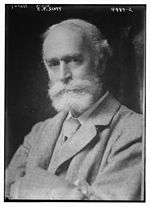
C. P. Scott
British journalist, publisher and politician (1846-1932)
Mark Dayton is a former governor of Minnesota, who also served as a U.S. Senator and Minnesota State Auditor. He comes from a prominent family, with his great-grandfather founding the Dayton’s department store chain, which later became Target. Dayton has had a long and varied political career, marked by his populist views and opposition to Reaganomics.
Table of Contents
Mark Brandt Daytonis an American politician who served as the 40th governor of Minnesota from 2011 to 2019. He served as a United States Senator representing Minnesota from 2001 to 2007 and as Minnesota State Auditor from 1991 to 1995. He is a member of the Minnesota Democratic-Farmer-Labor Party (DFL), which affiliates with the national Democratic Party.
A native of Minnesota, Dayton is the great-grandson of businessman George Dayton, the founder of Dayton’s, a department store that later became the Target Corporation. He embarked on a career in teaching and social work in New York City and Boston after graduating from Yale University in 1969. During the 1970s, he served as a legislative aide to U.S. Senator Walter Mondale and Minnesota Governor Rudy Perpich. In 1978, Dayton was appointed the Minnesota Economic Development Commissioner and married Alida Rockefeller Messinger, a member of the Rockefeller family.
Dayton ran for the U.S. Senate in 1982 against Republican Party incumbent David Durenberger. He defeated former U.S. senator Eugene McCarthy in the Democratic primary, and the general election became one of the most expensive in state history. Dayton campaigned as a populist in opposition to Reaganomics and famously promised “to close tax loopholes for the rich and the corporations–and if you think that includes the Daytons, you’re right.” Durenberger won the election, and Dayton returned to the Perpich administration until his election as Minnesota State Auditor in 1990.
In 1998, Dayton ran for governor, losing the Democratic nomination to Hubert Humphrey III. In 2000, he was elected to the U.S. Senate, defeating Republican incumbent Rod Grams. As senator, Dayton voted against the authorization for Iraq War, and became the first senator to introduce legislation creating a cabinet-level United States Department of Peace. In 2006, he chose not to seek reelection, citing his disillusionment with Washington, D.C., and fundraising.
In 2010, Dayton defeated Republican Tom Emmer to become governor of Minnesota despite national success for the Republican Party, including in the Minnesota legislature. He won a second term in 2014 over Republican opponent Jeff Johnson and opted not to run for a third term in 2018. His major legislative initiatives during his governorship include the legalization of same-sex marriage and the construction of U.S. Bank Stadium.
Mark Dayton has served as the 40th governor of Minnesota from 2011 to 2019, a U.S. Senator representing Minnesota from 2001 to 2007, and the Minnesota State Auditor from 1991 to 1995.
Mark Dayton is the great-grandson of George Dayton, the founder of Dayton’s department store, which later became the Target Corporation.
After graduating from Yale, Dayton embarked on a career in teaching and social work in New York City and Boston before transitioning into politics, serving as a legislative aide and later running for political office.
As a Senator, Dayton voted against the authorization for the Iraq War and introduced legislation to create a United States Department of Peace. As Governor, he legalized same-sex marriage and oversaw the construction of U.S. Bank Stadium.
Dayton’s 1982 Senate campaign against Republican David Durenberger was one of the most expensive in Minnesota history, and he later lost the Democratic nomination for governor in 1998 before winning the seat in 2010.
Dayton cited his disillusionment with Washington, D.C., and the challenges of fundraising as the reasons for his decision not to run for re-election to the U.S. Senate in 2006.
Once again, the Republicans in the Senate have rejected an increase in the minimum wage. They support tax breaks for multi-millionaires, but they oppose helping the working poor to earn a decent income.
40th Governor of Minnesota; former United States Senator from Minnesota
The Bush Administration claims there is a Social Security crisis only to distract Americans from its serious mismanagement of the federal budget.
40th Governor of Minnesota; former United States Senator from Minnesota
Many soldiers returning from Iraq and Afghanistan suffer from serious, long-term, physical and mental health problems, due to their service. It is unconscionable to cut the already limited health care benefits available to these brave men and women.
40th Governor of Minnesota; former United States Senator from Minnesota
Providing working Minnesotans with at least seven days of paid sick leave every year is the right thing to do to. It benefits our families and helps our businesses become more worker friendly and family friendly.
40th Governor of Minnesota; former United States Senator from Minnesota
Its going to be a squeeze, but we have got to put our men and women in uniform ahead of everything else. We’ve got to be treating our reservists fairly before we move on to other procurements.
40th Governor of Minnesota; former United States Senator from Minnesota
The fine print in the President’s Social Security proposal is that all present and future workers under age 55 will have their promised retirement benefits cut.
40th Governor of Minnesota; former United States Senator from Minnesota
Mercury emissions will continue to harm the environment and to endanger the health of children and pregnant women, until this Administration puts public health before politics.
40th Governor of Minnesota; former United States Senator from Minnesota
If the economy is strained, then Social Security, like the rest of the government, will be, too.
40th Governor of Minnesota; former United States Senator from Minnesota